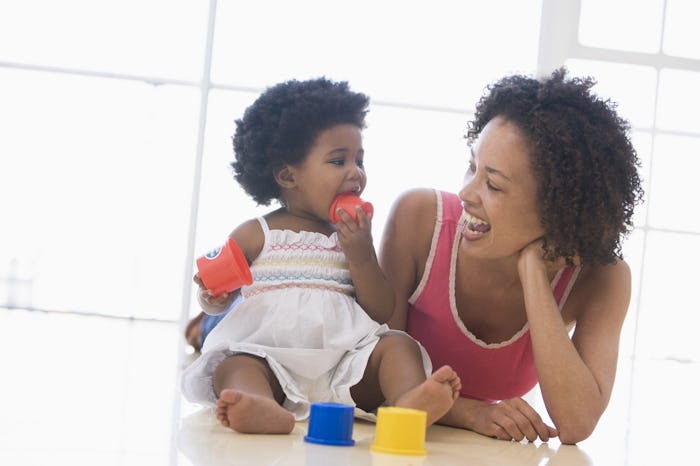Life

I Refuse To Apologize For Using "Baby Talk"
Maybe it's a discussion bound for the breastfeeding versus formula-feeding category, destined to debated for centuries to come. However, whatever way I choose to speak to my child is ultimately my decision, and one of the biggest reasons I refuse to apologize for using "baby talk" with my child.
Honestly, Baby talk gets such a bad rap, and in the last several years there have been studies and reports saying that baby talk is bad for child development. Then, of course, there were studies proving the opposite: that using baby talk with your kids is actually better for their language skills and bonding. Of course, it's important to clarify what I mean when I say "baby talk." We're not talking about repeating "goo-goo, ga-ga" over and over, or using nonsense words or gibberish. Instead, we're talking about that sing-song voice I find myself using all day long, when I'm getting my daughter dressed or reading her a book that only has one word per page, so I add a few extra.
Honestly, I think baby talk is what keeps us sane when we're talking to a creature that can't talk back, or only has a few words in their vocabulary that they like to repeat ad nauseam and until you think your head explodes. Plus, it's a great way for a child to engage and bond with you, as well as learn critical language skills. I don't plan on talking to her when she's 5, using all sing-song words and that high-pitched mom voice that makes even me cringe when I hear it, but for now I'm not apologizing for speaking to my baby with baby talk.
Because It's What Naturally Comes Out Of My Mouth
I can't think of a single time that my first reaction to seeing a baby was to speak to it like it was 35 years old. Baby talk is what naturally comes out of my mouth when I see any baby and when I talk to my own child, and I think that's a fair indication that that's how I can speak to my daughter.
I use real words, and I try to vary my vocabulary and make sure to enunciate, but what naturally comes out of my mouth when I speak to my daughter is good enough for me.
Because It Keeps Me Sane
There is absolutely no way I would make it through a whole day of just the two of us without turning my words into songs or adding extra intonation into my instructions to her. It keeps me sane when I'm completely sick of hearing my own voice.
Because I Only Recently Realized Some People Frown Upon It
Does that ever happen to you? You're going along, doing your "mom thing," and then realize there's a whole other parenting option that people are doing? Given, they may have made it up last month, but still, some parenting trends come out of the blue when you've already started down a path.
It's perfectly OK to stick to the path you're on if you so choose, and doesn't mean you have to apologize for anything.
Because It Engages My Child
All those studies promoting baby talk as language developing? They say one of the biggest benefits is that it helps your child engage and encourages them to begin trying to speak back. They can repeat some of the sounds you use faster than our normal words, and they actually go "ga-ga" for that high pitched sound.
Because Research Shows It Helps Them Learn Words
One of the keys to baby talk, or "parentese" as it's often called, is that you use actual words and enunciate vowels and consonants more than you typically would. So long as you're not exclusively using nonsense or gibberish, your enunciation and repetition is helping your baby's language development.
Because It Conveys My Emotion
Baby talk helps me convey emotion to my daughter, and while I sometimes think I sound like a drunken cheerleader — exclaiming at her tiny milestones and encouraging her barely-words — she knows how excited I am by the tone of my voice.
Likewise, she knows when I'm empathizing with her when she's upset or frustrated.
Because Adult Speech Bores Babies
Speaking like an adult to a 4 or 5 year old may help them mimic full sentences and proper grammar, but speaking like an adult to a baby just bores them. They tune out much more quickly to adult conversation than they do to baby talk, because the former tends to be more monotonous.
Baby talk also lends itself to facial expressions that are even more important for baby brains' wiring. A baby's brain lights up when it sees an adult's expression, especially smiling and excited, but rarely registers a face without expression. Just try to keep a straight face when you're talking baby talk, my friends. Yeah, it's impossible.
Because It's Working
At the risk of sounding like "that mom", who thinks her child is more brilliant than any child who has ever walked this earth (although, ahem, she just might be), my daughter's language development is soaring and at 15 months old, she's learning a new word or animal sound every day. I may sound ridiculous most of the time, but I wouldn't change a damn thing.